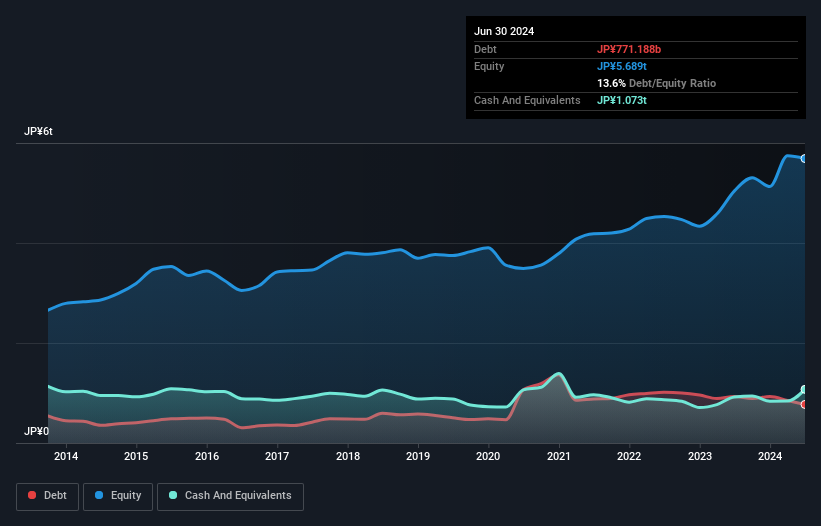
Some say volatility, rather than debt, is the best way to think about risk as an investor, but Warren Buffett famously said that 'Volatility is far from synonymous with risk.' It's only natural to consider a company's balance sheet when you examine how risky it is, since debt is often involved when a business collapses. As with many other companies DENSO Corporation (TSE:6902) makes use of debt. But is this debt a concern to shareholders?
When Is Debt Dangerous?
Debt is a tool to help businesses grow, but if a business is incapable of paying off its lenders, then it exists at their mercy. If things get really bad, the lenders can take control of the business. However, a more usual (but still expensive) situation is where a company must dilute shareholders at a cheap share price simply to get debt under control. Of course, the upside of debt is that it often represents cheap capital, especially when it replaces dilution in a company with the ability to reinvest at high rates of return. The first thing to do when considering how much debt a business uses is to look at its cash and debt together.
Check out our latest analysis for DENSO
How Much Debt Does DENSO Carry?
The image below, which you can click on for greater detail, shows that DENSO had debt of JP¥771.2b at the end of June 2024, a reduction from JP¥929.5b over a year. But on the other hand it also has JP¥1.07t in cash, leading to a JP¥301.3b net cash position.

A Look At DENSO's Liabilities
The latest balance sheet data shows that DENSO had liabilities of JP¥2.14t due within a year, and liabilities of JP¥1.06t falling due after that. Offsetting these obligations, it had cash of JP¥1.07t as well as receivables valued at JP¥1.18t due within 12 months. So its liabilities outweigh the sum of its cash and (near-term) receivables by JP¥952.6b.
Given DENSO has a humongous market capitalization of JP¥6.64t, it's hard to believe these liabilities pose much threat. But there are sufficient liabilities that we would certainly recommend shareholders continue to monitor the balance sheet, going forward. While it does have liabilities worth noting, DENSO also has more cash than debt, so we're pretty confident it can manage its debt safely.
On the other hand, DENSO's EBIT dived 11%, over the last year. We think hat kind of performance, if repeated frequently, could well lead to difficulties for the stock. The balance sheet is clearly the area to focus on when you are analysing debt. But ultimately the future profitability of the business will decide if DENSO can strengthen its balance sheet over time. So if you want to see what the professionals think, you might find this free report on analyst profit forecasts to be interesting.
Finally, while the tax-man may adore accounting profits, lenders only accept cold hard cash. While DENSO has net cash on its balance sheet, it's still worth taking a look at its ability to convert earnings before interest and tax (EBIT) to free cash flow, to help us understand how quickly it is building (or eroding) that cash balance. Over the most recent three years, DENSO recorded free cash flow worth 67% of its EBIT, which is around normal, given free cash flow excludes interest and tax. This cold hard cash means it can reduce its debt when it wants to.
Summing Up
Although DENSO's balance sheet isn't particularly strong, due to the total liabilities, it is clearly positive to see that it has net cash of JP¥301.3b. And it impressed us with free cash flow of JP¥486b, being 67% of its EBIT. So we don't have any problem with DENSO's use of debt. Over time, share prices tend to follow earnings per share, so if you're interested in DENSO, you may well want to click here to check an interactive graph of its earnings per share history.
Of course, if you're the type of investor who prefers buying stocks without the burden of debt, then don't hesitate to discover our exclusive list of net cash growth stocks, today.
New: Manage All Your Stock Portfolios in One Place
We've created the ultimate portfolio companion for stock investors, and it's free.
• Connect an unlimited number of Portfolios and see your total in one currency
• Be alerted to new Warning Signs or Risks via email or mobile
• Track the Fair Value of your stocks
Have feedback on this article? Concerned about the content? Get in touch with us directly. Alternatively, email editorial-team (at) simplywallst.com.
This article by Simply Wall St is general in nature. We provide commentary based on historical data and analyst forecasts only using an unbiased methodology and our articles are not intended to be financial advice. It does not constitute a recommendation to buy or sell any stock, and does not take account of your objectives, or your financial situation. We aim to bring you long-term focused analysis driven by fundamental data. Note that our analysis may not factor in the latest price-sensitive company announcements or qualitative material. Simply Wall St has no position in any stocks mentioned.
About TSE:6902
DENSO
Engages in the manufacture and sale of automotive parts in Japan, rest of Asia, North America, Europe, and internationally.
Solid track record with excellent balance sheet and pays a dividend.
Similar Companies
Market Insights
Community Narratives


